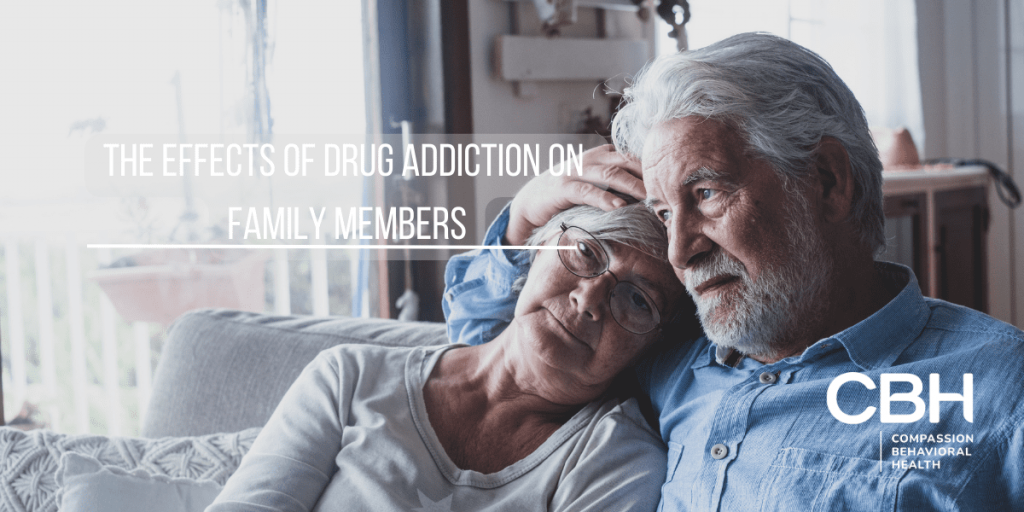Drug addiction is a pervasive issue that not only affects individuals struggling with substance abuse but also has devastating effects on their family members. Understanding the complexity of drug addiction and its impact on families is crucial in order to address the challenges and provide necessary support. In this article, we will explore the science behind addiction, commonly abused substances, the emotional impact on family members, the financial consequences, health risks, and the strain on family relationships.
Understanding Drug Addiction
Drug addiction is a chronic and relapsing brain disorder. It is characterized by an individual’s compulsive drug-seeking and use despite adverse consequences. The science behind addiction reveals that repeated drug use affects the brain’s reward system, leading to intense cravings and a loss of control over drug consumption.
When it comes to understanding drug addiction, it is important to delve into the intricate details of the science behind it. Scientific studies have shown that addiction is not simply a matter of weak willpower or lack of moral character. Instead, it is a complex interplay of genetic, environmental, and individual factors.
The Science Behind Addiction
Genetic predisposition plays a significant role in an individual’s vulnerability to addiction. Certain genetic variations can make some people more susceptible to developing addictive behaviors when exposed to drugs. These genetic factors can influence how the brain’s reward system responds to drugs, making some individuals more prone to experiencing intense cravings and a loss of control over drug consumption.
However, genetics alone do not determine whether someone will become addicted to drugs. Environmental factors also play a crucial role. For example, peer pressure can greatly influence an individual’s decision to experiment with drugs. Being surrounded by friends or acquaintances who engage in drug use can increase the likelihood of developing addictive behaviors.

Furthermore, traumatic experiences can contribute to the development of addiction. People who have experienced physical or emotional trauma may turn to drugs as a coping mechanism, seeking temporary relief from their pain or distress. The brain’s reward system can be hijacked by drugs, providing a temporary escape from the harsh realities of life.
Commonly Abused Substances
There are various substances that are commonly abused, each with its own set of effects on the brain and body. Opioids, for example, are highly addictive substances that are commonly prescribed for pain relief. They bind to opioid receptors in the brain, blocking pain signals and producing a sense of euphoria. However, prolonged use can lead to physical dependence and withdrawal symptoms when the drug is discontinued.

Stimulants, on the other hand, increase alertness, attention, and energy. They can enhance focus and productivity, making them appealing to students and professionals. However, repeated use can lead to tolerance, requiring higher doses to achieve the desired effects. This can eventually lead to addiction and a range of negative consequences on physical and mental health.
Sedatives, also known as tranquilizers or depressants, are substances that slow down brain activity. They are commonly prescribed for anxiety and sleep disorders. However, when used recreationally or in higher doses than prescribed, sedatives can induce a state of relaxation and euphoria. Continued use can lead to dependence and withdrawal symptoms.
Hallucinogens, on the other hand, alter perception, thoughts, and feelings. They can cause hallucinations, intense sensory experiences, and altered states of consciousness. While some people may use hallucinogens for spiritual or recreational purposes, these substances can also have unpredictable and potentially dangerous effects on mental health.

Examples of commonly abused drugs include heroin, a powerful opioid that produces intense euphoria and pain relief; cocaine, a stimulant that increases energy and produces a sense of confidence; prescription painkillers, such as oxycodone and hydrocodone, which are often misused for their pain-relieving and euphoric effects; and methamphetamine, a highly addictive stimulant that increases wakefulness and energy.
Understanding the science behind addiction and the commonly abused substances is essential in developing effective prevention and treatment strategies. By expanding our knowledge and awareness, we can work towards combating the devastating effects of drug addiction on individuals, families, and communities.
Emotional Impact on Family Members
Drug addiction takes an emotional toll on family members as they witness the deterioration of their loved one’s health and well-being. Dealing with denial and deception becomes a constant challenge in such situations.

As family members watch their loved one’s health deteriorate, they often find themselves grappling with a mix of emotions. The sadness and heartbreak of seeing someone they care about suffer can be overwhelming. They may feel a sense of helplessness, as if they are standing on the sidelines, unable to do anything to stop the addiction from taking hold.
Dealing with denial is a common struggle for family members. It’s natural to want to believe that the addiction problem will simply go away on its own, that their loved one will wake up one day and decide to get clean. But the reality is often far from that ideal scenario. Accepting the truth and acknowledging the severity of the addiction is essential in order to provide effective support.
Dealing with Denial and Deception
Family members often find themselves in a cycle of denial, hoping that the addiction problem will simply go away. However, facing the truth is essential to provide effective support. Deceptive behaviors, such as lying and manipulation, are common among individuals struggling with addiction, causing additional emotional distress for their family members.
When faced with a loved one’s addiction, family members may encounter a web of deception. Addicted individuals often resort to lying and manipulation to hide the extent of their problem or to maintain their access to drugs. This constant deceit can erode trust within the family, leading to feelings of betrayal and anger.
Family members may find themselves questioning their own judgment and perception of reality. They may wonder if they missed warning signs or if they could have done something differently to prevent the addiction from taking hold. This self-doubt can be emotionally draining, adding an extra layer of complexity to an already challenging situation.
The Toll of Emotional Stress
The emotional stress experienced by family members can be overwhelming. Feelings of helplessness, fear, and anger may arise as they witness their loved one’s addiction spiral out of control. This emotional strain can lead to depression, anxiety, and a sense of isolation within the family.

Family members often find themselves on an emotional rollercoaster, constantly worrying about their loved one’s well-being and safety. The fear of receiving a phone call with devastating news becomes a constant presence in their lives. This chronic stress can take a toll on their own mental and physical health, leading to sleep disturbances, loss of appetite, and a weakened immune system.
Moreover, the emotional strain of dealing with addiction can create a sense of isolation within the family. Family members may feel reluctant to share their struggles with others, fearing judgment or misunderstanding. This isolation can further exacerbate the emotional burden they carry, as they navigate the complexities of addiction without a strong support network.
In conclusion, drug addiction not only affects the individual struggling with the addiction but also has a profound impact on their family members. Dealing with denial and deception, as well as the toll of emotional stress, can be incredibly challenging for those who love someone battling addiction. It is crucial for family members to seek support and resources to help them navigate these difficult circumstances and find ways to take care of their own well-being while supporting their loved one’s recovery journey.
Financial Consequences of Drug Addiction
The financial impact of drug addiction extends far beyond the cost of the substances themselves. Families often face significant financial strain as a result of a loved one’s addiction.
Drug addiction is a complex issue that affects not only the individual struggling with substance abuse but also their entire support system, including family members. The financial consequences of drug addiction can be devastating, causing a ripple effect that impacts various aspects of a family’s financial stability.
The High Cost of Substance Abuse
Substance abuse comes at a high cost, both in terms of the expense of acquiring drugs and the subsequent legal consequences. The financial burden of addiction can quickly add up, as individuals find themselves spending exorbitant amounts of money to fuel their habit. The constant need for drugs leads to a never-ending cycle of spending, often leaving individuals in a state of financial desperation.
Moreover, the legal consequences of drug addiction can further compound the financial burden. Individuals caught in possession of illegal substances may face hefty fines, legal fees, and even incarceration. These legal repercussions not only drain financial resources but also hinder the individual’s ability to maintain employment and earn a steady income.

Impact on Family’s Financial Stability
Drug addiction can quickly deplete a family’s financial resources. Money that could be used for essential needs such as housing, education, and healthcare may be diverted to support the addict’s habit. The financial strain can be overwhelming, as families struggle to balance the needs of the addicted individual with the needs of the entire household.
As the addiction progresses, individuals struggling with substance abuse may find it increasingly difficult to maintain employment. The physical and mental toll of addiction often leads to a decline in job performance, absenteeism, and even job loss. This loss of income further exacerbates the financial instability experienced by the family, making it challenging to meet basic living expenses and maintain a decent quality of life.
Additionally, the financial impact of drug addiction extends beyond immediate expenses. Families may find themselves burdened with long-term financial obligations, such as medical bills resulting from health complications related to substance abuse or legal fees associated with the consequences of addiction.
Furthermore, the stress and strain of dealing with a loved one’s addiction can have indirect financial consequences. Family members may experience emotional distress, leading to increased healthcare costs for therapy or counseling. The constant worry and anxiety can also affect their ability to focus on work, potentially resulting in decreased productivity and missed opportunities for career advancement.
In conclusion, the financial consequences of drug addiction are far-reaching and can have a profound impact on both the individual struggling with substance abuse and their entire support system. The high cost of acquiring drugs, coupled with legal consequences and the impact on employment, can quickly deplete a family’s financial resources. The financial instability that follows can lead to a multitude of challenges, including difficulty meeting basic needs and long-term financial obligations. It is crucial to address the financial consequences of drug addiction alongside the physical and emotional aspects to provide comprehensive support for individuals and their families on the path to recovery.
Health Risks Associated with Drug Addiction
Drug addiction not only affects the addict’s health but also poses indirect health risks to family members.
Direct Health Risks to the Addict
Drug abuse can lead to a range of health problems, including liver disease, cardiovascular complications, respiratory issues, and increased susceptibility to infections. Additionally, the risk of overdosing and associated fatalities is a constant concern for individuals struggling with addiction.
Indirect Health Risks to Family Members
Families living with a drug-addicted individual may experience increased stress levels that can negatively impact their physical and mental well-being. They may also be exposed to unsafe environments or engage in risky behaviors in order to obtain drugs for their loved ones.
The Strain on Family Relationships
Drug addiction often causes significant strain on family relationships, leading to the erosion of trust, breakdown in communication, and feelings of isolation and alienation.

Erosion of Trust and Communication
The deceptive nature of addiction erodes trust within the family unit. Family members may become suspicious, always questioning the addict’s actions and statements, which can create a hostile environment. Communication breakdown is also common, as open and honest discussions become increasingly difficult.
Isolation and Alienation within the Family
The effects of addiction can cause family members to feel isolated from their loved ones. The constant focus on the addict’s needs and behaviors often leads to neglect of other family relationships. This sense of isolation and alienation can result in emotional and physical distance between family members.
In conclusion, drug addiction has far-reaching and devastating effects on family members. Understanding the science behind addiction, the emotional impact, financial consequences, health risks, and strain on family relationships is essential in order to provide support and resources to those affected by this challenging issue. By recognizing the complexities of addiction, society can work together to mitigate its impact on families and promote a healthier future for all.
Get Help for Your Loved One at Compassion Behavioral Health
At Compassion Behavioral Health, we are committed to providing comprehensive support and treatment options for individuals struggling with drug addiction and their families. Our dedicated team of professionals understands the complexities of addiction and its impact on individuals and their loved ones. We offer a range of evidence-based therapies and support services to address the physical, emotional, and financial challenges associated with addiction. Our goal is to guide individuals and their families on the path to recovery, helping them rebuild their lives and relationships. If you or a loved one is facing the challenges of drug addiction, reach out to us today for compassionate and personalized care.



